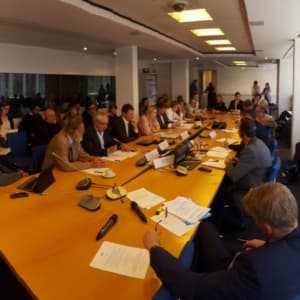2018-09-28 12:00
On Wednesday September 26, CESI held a further edition of its lunchtime debate series ‘CESI@noon’, this time on the very heated topic of the interpretation of working time legislation – more specifically on possible impacts of the recent ‘Matzak’ judgment of the European Court of Justice (CJEU) of February 21 2018 which had ruled that, under EU law, stand-by time of a worker at home who is obliged to respond to calls from the employer within a short period must be regarded as ‘working time’.
The event was composed of two parts, the first one consisting of an internal meeting among CESI affiliates to discuss the major conflictual aspects of the judgment and the subsequent situation experienced at national levels. The second part was a public event, attended by a variety of stakeholders and interested parties.
The panel included the lawyer of plaintiff Rudy Matzak, Pierre Joassart; a legal officer from the European Commission, Andrea Grgic; the Vice-President of Avenir Secours and CESI affiliate Alain Laratta; the President of the Luxembourgish trade union FGFC and member of CESI Marco Thomé; and the Vice-President of the justice sector of the Spanish trade union CSIF and CESI member Javier Jordán de Urríes. The moderator, Pierre Baussand, led a through an active and lively discussion which focused in particular on the different professions which would be impacted by the judgment.
It appeared that not only firefighters could expect changes, but also any professions that are using the on-call working time can expected to be re-thought, or at least considered as being impacted by the ruling, including the health and social care sector.
The cumulation of working hours as a result of people pursuing different jobs at different employers and the exemptions of the EU working time directive in this regard were an unavoidable part to the debates. The discussion also addressed in particular the need for an organisational change of the national voluntary firefighting systems. It was mentioned that voluntary firefighters often accumulate more than 100 hours per week next to their main job, if their on-call home-based working time is to be indeed considered as working time. How could this possibly be reconciliated with legislation?
This also brought up the question of responsibility and remuneration. How will on-call time be financially compensated? Who is to be held accountable for the breach of the 48 hours per week limit under the EU working time directive, and how will it be possible for local authority to bear additional staff costs?
CESI will follow up on this event and this topic which will continue to be at the centre of this debate at the EU but certainly at the national levels too. A note by the CESI General Secretariat summarising the main arguments of the case and its implications is available here.
Find here a previous article published on CESI’s website on the subject matter and here the article that Pierre Joassart wrote on it. Further information is also available in the press release of the ECJ on the case. The full judgment is available here.




